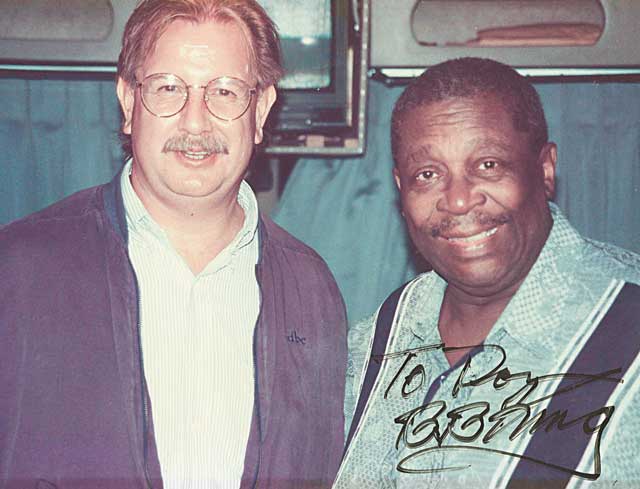Blessed By B.B.’s Music
Preparing to interview B.B. King in October 1995 for a MidWeek cover story, I read a biography on him, re-listened to two Public Radio interviews I’d taped a few years earlier, further immersed myself in his music, and then flew from Honolulu through Atlanta to Memphis. So standing outside B.B.’s dressing room between shows at his Beale Street club, the thrill was definitely gone when his road manager said that plans had changed. It was B.B.’s 70th birthday weekend, he explained — even the president had called — and instead of 45 minutes with the world’s greatest blues singer as I’d been promised, I’d have 20.
So when B.B. launched into a story about how he ended up in Memphis after growing up a sharecropper in Mississippi, I interrupted as politely as I could.
“Right,” I said, “that’s the day you ran Farmer Barrett’s tractor up under the house when it didn’t shut off right away, and knocked off the smoke stack, and you were so scared you left without collecting your pay and hitchhiked up to Memphis with nothing but a sausage in your pocket.”

The author with B.B. King at his Beale Street club in Memphis, 1995 PHOTO FROM DON CHAPMAN
“Oh, you know that story, do you?”
“Yes, sir, and I’m sorry to interrupt, but I was told I won’t have as much time with you as I thought, so …”
He smiled, nodded and allowed me to stay for more than an hour, and the interview continued as various well-wishers and fans came to see him, and lingered, as fascinated by his replies as I was. First time I conducted an interview with a live audience.
B.B. King is my favorite all-time musician, and I was saddened to hear of his passing last week. Actually, the sadness started earlier when I heard he was in hospice care at his home in Las Vegas, and thought about all the times I saw him perform over the years — three shows in Honolulu, four in Memphis, one in San Francisco. I got to go backstage to greet him after his Dec. 31, 1995, show at Sheraton-Waikiki, and have a photo from Memphis autographed. On another occasion, I interviewed him by phone, calling an L.A. hotel and asking for “Cannonball Jackson,” the name under which he’d registered.
The last time I saw him was at the Blaisdell Arena in April 2011, and I’m pleased my son Kai, who with sister Dawn grew up being forced to listen to Dad’s tapes and CDs of B.B. in the car and at home, was able to see and hear and appreciate the greatness of B.B. in person. In fact, it was Kai who called me last Thursday evening with news that B.B. had passed, sadness in his voice.
In all my dealings with him, B.B. was polite, humble and thoughtful. He took pride in being a bluesman, following in the footsteps of his music hero Louis Jordan, who he described as “a true entertainer.” (Late in his career, B.B. recorded an album of Louis Jordan covers, including the classic Ain’t Nobody Here But Us Chickens.)
A personal recollection: When I shook hands with B.B., his hand gloved mine — he had huge hands with long fingers that ate up the fretboard of his guitar “Lucille.” He produced the most unique sound, utterly distinctive, and within an opening note or two you recognized it as B.B. and Lucille. He could play rockin’ blues, as on Eyesight to the Blind, in which he sings about a woman whose good loving could give eyesight to the blind and raise up the dead, or slow, minimalist jazz riffs, as on Night Life.
But it was always about the blues.
“Some people think the blues is sad,” he said, “but that’s not right. The blues is to make you feel good.”
B.B. sure made a lot of folks feel good.
And he took care of a lot of people. In that first interview, I asked what drove him to perform upwards of 300 nights a year for many years.
“I have a band to take care of,” he explained, and band members have families to take care of.
Similarly, it’s said he fathered at least a dozen children during his years of onenighters (in more ways than one), and he took responsibility for each and contributed to the children’s care.
So many fitting lyrics come to mind, but this verse sums it up quite well, from Blues Man:
The burdens that I carry are
so heavy, you see
It seems like it ain’t nobody
in this great big world
That would wanna help old
B
But I will be all right,
people
Just give me a break
Good things come to those
who wait
And I’ve waited a long time
I’m a blues man, but a good man, understand
Yes, he was, and my life is richer for his music and for our conversations.
Thank you, B.B. Let the good times roll.





